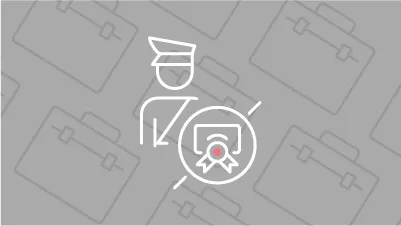All students are required to bring their own notebooks for lessons. You may refer to the required technical specifications for notebook HERE.
| REGISTRATION PERIOD APPLICATIONS CURRENTLY CLOSED |
|||
| COURSE DATE | 21 Apr 2025 - 17 Oct 2027 | COURSE DURATION / FREQUENCY | 3 hours/session (3 days/week) |
| MODE OF LEARNING | Facilitated Learning (Face-to-Face/ Online Synchronous) and Asynchronous E-Learning | COURSE VENUE | Temasek Polytechnic |
Singapore places significant emphasis on its security policies and management to create a safe and secure country to live, work and play. If you would like to play a part in protecting and serving your local communities, this course will arm you with the required skill sets to embark on a career in the field.
The Diploma will equip you with the knowledge and skills to perform the roles of law enforcement officers and private security managers and officers. Upon completion of this course, you will be able to:
- Work effectively in large or small organisations
- Identify legal issues relating to the law enforcement and security industry and apply them in their work
- Plan and implement security measures for an organisation, physical installations and transportation by land, air and sea
- Identify cybersecurity threats and implement cybersecurity protection and response plans
- Conduct basic digital forensic investigations
- Apply concepts of criminal justice and punishment to their daily work
- Apply psychological and behavioural science principles to law enforcement and security work
- Use office productivity and communication tools effectively
- Analyse data and statistics as tools for law enforcement
This diploma course incorporates four SUSS modules that are also offered as modular courses. Graduates from the Diploma can continue to upgrade their knowledge and skills in the Part-time Undergraduate Programme in Public Safety and Security offered by SUSS. Upon completion of the Challenge Examination conducted by SUSS, successful applicants will receive credit recognition for the SUSS-provided modules!
| Subject Code | Subject | ||
|---|---|---|---|
| BCLM044 | Security Operations & Administration
This provides students with an insight into the knowledge and skills required to effectively manage security functions within an organisation or a sector. The topics provide an understanding on a wide range of public, corporate and commercial security functions in potentially challenging and hostile environments. This course also highlights best practices in the security industry, equipping students with procedures and knowledge on security related management in different sectors. Other topics include people management, conflict resolution and development strategies. The focus is on working in partnership with different stakeholders in the formulation of effective protocols and practices. |
||
| BCLM021 | Physical Security
This subject aims to provide students with in-depth knowledge and skills to be able to advise on the range, selection, application and limitations of physical security means and measures for residential, commercial and high-risk installations and developments. |
||
| BCLM041 | Transportation Security
The subject aims to provide students with the necessary knowledge and skills to implement security preventive measures in accordance with appropriate rules governing transport by land, sea & air. |
| Subject Code | Subject | ||
|---|---|---|---|
| CPS1C01 | Cybersecurity Fundamentals
This subject aims to introduce principles of cybersecurity and their applications, and covers what is required to protect and defend the digital system and applications in the cyber space. The subject will cover common types of cyber risks, threats and attacks as well as the applicable controls. |
||
| CPS1C02 | Cybersecurity Incidence Response
This subject covers the plans and procedures for responding to cybersecurity incidents and events such as unauthorised access, malicious attacks and denial of services. It establishes the proper process of assessing the impact of such incidents and effective management of activities such as collecting, analysing and reporting such incidents. |
||
| CPS1C03 | Digital Forensics Fundamentals
This subject introduces the methodology and techniques required to discover digital evidences in order to determine the cause and effect of a cybercrime. Students will review case facts to determine the co-relation of events and timelines to a crime. The subject will also cover steps from extracting evidences and reconstructing a security incident to producing and presenting findings to support investigations for litigation purposes. |
| Subject Code | Subject | ||
|---|---|---|---|
| GBS2003 | Psychology & Law Enforcement
This subject provides an introduction to how psychological science can be applied to law enforcement work. Students will be exposed to relevant areas within psychology that can better equip them in their law enforcement work, such as theories of criminal behaviour and profiling that allow students to have a better understanding of why criminal activities occur, basic helping and management skills that allow students to provide psychological first aid for victim and to manage different people from the community, and basic behavioural insights concepts that students can apply to be more effective in their work. |
||
| BCLM027 | Mediation & Counselling
This subject aims to introduce students to the fundamental concepts of mediation and counselling so as to help students understand the role of mediators and counsellors and the ethical issues related to mediation and counselling. It also aims to equip students with basic practical skills in mediation and counselling so that they will be able to handle simple mediation and counselling cases. |
||
| BCLM045 | Crime, Justice & Punishment
This subject aims to increase students' awareness and critical understanding of the key concepts and theoretical approaches in the area of crime, justice and punishment. This course highlights the justification for punishment and the consequences of criminalisation and punishment on the individual, community, and state. By understanding the socio-economic and political implications of crime and punishment, students will be able to better appraise the policies and practices in those areas. |
| Subject Code | Subject | ||
|---|---|---|---|
| BCBT015 | Future Office Productivity Tools
This subject covers the various digital tools used to improve efficiency, productivity for both individual and team performance in office. It also emphasises the various ways to overcome the potential risk of digital distractions and cyber-security. |
||
| BCBT016 | Business IT & Data Analytics
This subject provides an overview of how digitalisation and business technology impact the future of work and businesses. It also encompasses the utilisation of digital information and applications to facilitate decision-making and problem-solving through data analysis and visualisation. |
||
| BCLO012 | Statistics for Policing
The subject provides an overview of descriptive and inferential statistics with applications on law enforcement administration, operations and management. It includes tools in describing and presenting data, basic concepts of probability & distribution, parameter estimation, hypothesis testing and regression analysis. The subject also introduces the use of computer software to perform statistical computations. |
Modes of Assessment
- Quizzes
- Assignments
- Projects
For more information on course fee / schedule, or to apply,
Career Opportunities
Upon completing DPSM, graduates can look forward to more opportunities to apply the skills and knowledge learned within SPF or in private security companies, including the following positions:
- Police Officer
- Auxiliary Police Officer
- Security Officer
- Senior Security Officer
- Security Supervisor
- Senior Security Supervisor
- Security Manager
Entry Requirements
| ‘O’ Levels | At least 3 ‘O’ Level passes AND 1 year of relevant working experience |
| OR | |
| Higher Nitec | GPA ≥ 2.0 |
| OR | |
GPA ≥ 1.5 AND 1 year of relevant working experience |
|
| OR | |
| Nitec | GPA ≥ 3.5 |
| OR | |
GPA ≥ 3.0 AND 1 year of relevant working experience |
|
| OR | |
| Higher Nitec in Technology | GPA ≥ 2.0 AND 1 year of relevant working experience |
| OR | |
| Higher Nitec in Service | GPA ≥ 2.0 AND 1 year of relevant working experience |
| OR | |
| Nitec in Technology | GPA ≥ 3.5 AND 1 year of relevant working experience |
| OR | |
| Nitec in Service | GPA ≥ 3.5 AND 1 year of relevant working experience |
| OR | |
| WSQ Qualification | Relevant WSQ Qualification with 1 year of relevant working experience AND WSQ Workplace Literacy Statement of Attainment (SOA)(Level 6) AND Workplace Numeracy Statement of Attainment (SOA)(Level 6) AND 1 year of relevant working experience |
| OR | |
| Without relevant academic qualifications | At least 2 years of relevant working experience |
Applicants who do not meet the entry requirements may be considered for admission to the course based on evidence of at least 2 years of relevant working experience or supporting evidence of competency readiness. Suitable applicants who are shortlisted may have to go through an interview and/or entrance test. The Polytechnic reserves the right to shortlist and admit applicants.
Course Contact
- Mainline 67881212
-
Monday - Thursday: 8:30am - 6:00pm
Friday: 8:30am - 5:30pm
Closed during lunchtime, 12:00pm - 1:00pm
and on weekends and public holidays. - https://www.tp.edu.sg/tsa
-
Temasek SkillsFuture Academy (TSA)
Temasek Polytechnic
East Wing, Block 1A, Level 3, Unit 109
21 Tampines Ave 1
Singapore 529757
Temasek Polytechnic reserves the right to alter the course, modify the scale of fee, amend any other information or cancel course with low enrolment.












